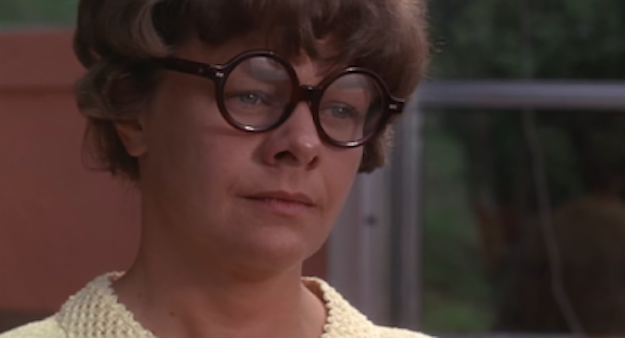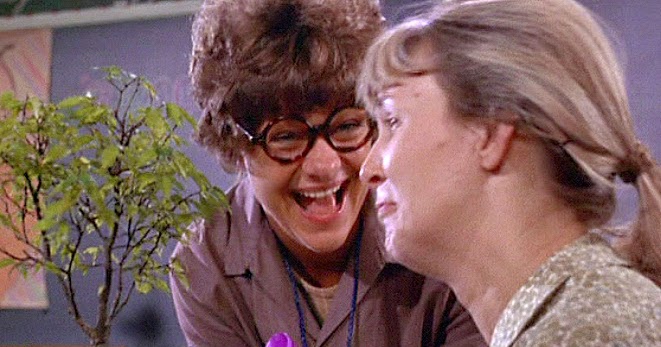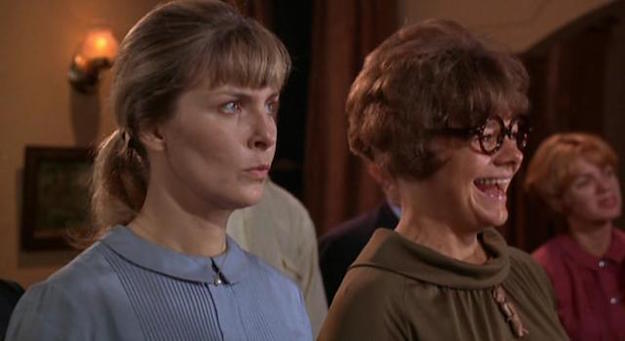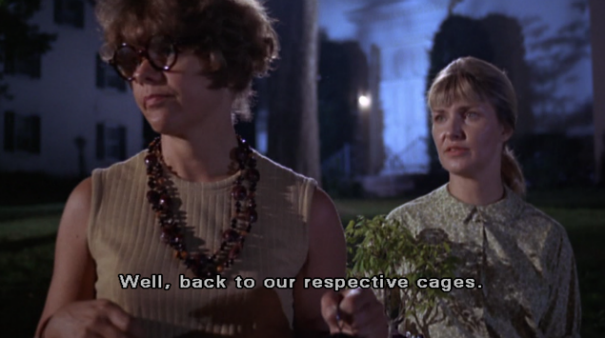Gay Best Friend: Calla Mackie in "Rachel, Rachel" (1968)
 Monday, February 22, 2021 at 3:30PM
Monday, February 22, 2021 at 3:30PM a series by Christopher James looking at the 'Gay Best Friend' trope
 Who wouldn't risk it all for Estelle Parsons in those Edna Mode glasses?
Who wouldn't risk it all for Estelle Parsons in those Edna Mode glasses?
We’re continuing our retro streak of the Gay Best Friend series this week, though we’re moving a bit forward in time (and to the subject of a Smackdown). In our Rebel Without a Cause entry, we discussed how director Nicholas Ray, actor Sal Mineo and writer Stewart Stern all coded Plato as gay, even though the Hays Code wouldn’t let homosexuality be openly discussed on film. This week, we’re looking at another Stewart Stern script, Rachel, Rachel. That film premiered thirteen years later (1968) and with the dissolution of the code we see less of a need to rely on coding. Estelle Parsons’ gregarious teacher Calla Mackie is established as a lesbian within the film. However, it reinforces tropes in gay representation that would continue for decades later. Calla may be a burst of energy early on, but her story moves into the “sad lesbian” and “tragic gay” frameworks we’ve become all too familiar with.
Before delving into Calla, we have to set up the object of her affection, the titular Rachel (Joanne Woodward)...
 Can someone look at me the way Calla looks at Rachel looking at a sad tree?
Can someone look at me the way Calla looks at Rachel looking at a sad tree?
Rachel is a shy school teacher who struggles to get out of bed in the morning. We feel the depression weighing her down through this first section of the film. A radiant star, Woodward makes Rachel’s flattened demeanor rather riveting. What is keeping this woman from being her fullest self? Rachel Rachel is a story about life’s possibilities, or the lack thereof of possibilities. Caring for her ailing mother (Kate Harrington) and stuck in her hometown, Rachel thinks every day is the same with too many responsibilities hampering any potential growth.
Rachel Cameron: Oh, guess who invited me for supper tonight, and I said "No". The groper.
Calla Mackie: He probably serves rat. Come on up after, I bought you a... a nothing gift.
Rachel Cameron: What?
Calla Mackie: A companion that needs taking care of. But unlike your mother, it doesn't talk back.
Behind every wallflower is a scene stealer. When Rachel finally makes it to her class, we’re introduced to Calla, her best friend and fellow teacher. Immediately, Calla pulls Rachel to the side while the children play. It could be that she just wants to gossip with Rachel, but her body language conveys a deeper intensity. Her manic energy is as loud as her chunky jewelry. Beckoning Rachel to her room with a gift, Calla is trying to express her affection. Rachel moves outside, not taking Calla up on her offer. While outside, she sees Calla and her students set a bird free. Looking at the bird, Rachel sees a freedom that neither she nor Calla feel. However, Calla knows how to set things free and express herself, even if she always has to keep her guard up. She may not even fully realize it herself, but Calla acts as Rachel’s gateway to being more in touch with herself.
 Even though we spend so much time in Calla's church, it was hard to place how progressive or regressive it was. Can someone hand me a pamphlet on this church's basic teachings?If Rachel’s journey is from being shy and depressed to active and decisive, Parsons’ Calla goes on the sadder, opposite journey. She’s a flamboyant co-worker who tries to crack Rachel’s tough exterior by bringing her to her new age church. As Calla attempts to forge a connection with Rachel, she reveals too much of herself and her desires when she kisses Rachel at a pivotal moment. Rachel does not reciprocate this kiss. Instead she runs away, leaving Calla crying after her, apologizing. The spunk and vivacity we saw from Calla’s introduction deflates over the movie. This is what happens when queerness that is coded gets literalized and externalized. You can hint that Calla is a lesbian through her chunky jewlery, confidence and interest in Rachel. Once you confirm these suspicions by having her kiss Rachel, she has to pay for her sins of homosexuality.
Even though we spend so much time in Calla's church, it was hard to place how progressive or regressive it was. Can someone hand me a pamphlet on this church's basic teachings?If Rachel’s journey is from being shy and depressed to active and decisive, Parsons’ Calla goes on the sadder, opposite journey. She’s a flamboyant co-worker who tries to crack Rachel’s tough exterior by bringing her to her new age church. As Calla attempts to forge a connection with Rachel, she reveals too much of herself and her desires when she kisses Rachel at a pivotal moment. Rachel does not reciprocate this kiss. Instead she runs away, leaving Calla crying after her, apologizing. The spunk and vivacity we saw from Calla’s introduction deflates over the movie. This is what happens when queerness that is coded gets literalized and externalized. You can hint that Calla is a lesbian through her chunky jewlery, confidence and interest in Rachel. Once you confirm these suspicions by having her kiss Rachel, she has to pay for her sins of homosexuality.
It’s very interesting that Paul Newman made Rachel, Rachel his directorial debut. Yes, he had been married to Joanne Woodward for almost a decade at this point. However, the film required her to portray such vulnerability in the face of new situations. Following that kiss with Calla, Rachel accepts the sexual advances of Nick (James Olsen), an old high school classmate who very directly admits he’s just looking for some action. Add in a mistaken pregnancy, ovarian cysts and a plan to pick up and move to Oregon and you have an eventful summer for Rachel. Perhaps Newman was able to get a different level of vulnerability from Woodward that extended to the rest of the production. Woodward never shies away from the cringe inducing awkwardness of Rachel’s day to day life and sexual escapades. She makes you feel the work of every action. This allows Calla to feel so much bigger (and not just because of the large, round glasses). Both women have their awkwardness on full display in public and can’t hide it.
 Not so fast, Calla!
Not so fast, Calla!
Calla Mackie: I’m always pushing things out of their cages.
As Rachel gets on that bus at the end of the film, she leaves Calla behind. All of the false starts and dead ends have finally led her to a place where she can move forward. The triumph is mixed with sadness as the two women stare at each other from opposite sides of the bus. Through sexual expression, Rachel was able to get a better handle on herself and assert some level of independence. Thus, she gets to leave her cage and be free. Meanwhile, Calla asserts her sexuality and is rebuffed. It’s not as simple as a rejection. She’s losing a friend and has confirmation that this life she had built in her head for Rachel and her will never come to be. She’s still stuck in this town and her cage, even though she has pushed Rachel out of her own cage.
Unfortunately, this is the plight of the gay best friend during this time. They can act as your confidant. On a script level, they can move the plot forward or set it into motion. However, even if they are given an interior life, they aren’t given a happy ending. Parsons, fresh off her Oscar win for Bonnie and Clyde, does a great job of giving Calla more depth. She lives her life with great vigor, even if that same level of energy seems to sabotage or short circuit her in situations with Rachel. Rather than just be a device in Rachel’s journey to self discovery, Parsons makes sure that Calla’s nervous POV always shines through. The movies weren’t in the habit of giving queer characters a happy ending, but here’s hoping Calla found another lovely paramour in Rachel’s replacement. If not there, I’m sure there must be some other lesbians in that congregation of hers. “Not to worry, I’ll survive,” Calla says. Somehow, I believe her.
Previously in Gay Best Friend
- Plato (Sal Mineo) in "Rebel Without a Cause" (1955)
- Toddy (Robert Preston) & Squash (Alex Karras) in Victor/Victoria (1982)
- Sammy Gray (Steve Zahn) in Reality Bites (1994)
- Gareth (Simon Callow) and Matthew (John Hannah) in Four Weddings and a Funeral (1994)
- George Downs (Rupert Everett) in My Best Friend’s Wedding (1997)
- George Hanson (Paul Rudd) in The Object of My Affection (1998)
- Bill Truitt (Martin Donovan) in The Opposite of Sex (1998)
- Robert (Rupert Everett) in The Next Best Thing (2000)
- Patti (Sandra Oh) in Under the Tuscan Sun (2003)
- Nigel (Stanley Tucci) in The Devil Wears Prada (2006)
- Wallace Wells (Kieran Culkin) in Scott Pilgrim vs the World (2010)
- Abby Gerhard (Sarah Paulson) in Carol (2015)
- Duncan (Pete Davidson) in Set It Up (2018)
- Jack Hock (Richard E. Grant) in Can You Ever Forgive Me (2018)



Reader Comments (9)
I feel like i'm the only person who has seen this movie multiple times so thank you for this writeup. I LOVE Estelle in this. (so much better than in her Oscar winning role the year before) And I think she really fleshes out the character as you point out. It helps that Newman & Woodward's duet here is very attuned to sexuality and its mysteries.
The movie should have been Calla, Calla. She is a far more interesting character and the script gives her a backstory but leaves gaps for the audience to fill in and think about for themselves. Parsons has infused her with such energy that she completely steals the movie. I didn't care for this film or for Rachel very much but when it was over I wanted a sequel with just Calla.
This, not BONNIE AND CLYDE, should've been Parsons' Oscar.
Sorry but Ruth Gordon's Oscar is one of the best in the category although Parsons is very worthy runner up.
I love the movie and re-watch regularly on my DVD. Both actresses are superb, Oscar worthy (at least nominated and thankfully still with us). I'm still thinking of that doctor's office scene and Rachel's reaction. The music is lovely, too. That was a great writeup, thank you.
A strong contrast to this piece can be found in Film Comment, a piece written by Michael Koresky of the Film Society at Lincoln Center. Koresky's work examines Calla under a broader umbrella of how the film addresses female sexuality..
https://www.filmcomment.com/blog/queer-now-1968/
I absolutely love this movie! One of my all time favourites. I think Parsons, Woodward and Newman all do fantastic work here.
I read that, allegedly, Paul Newman bought the rights to a novel dealing with a gay man's coming out and falling in love. Newman was set to direct and star in the movie but when the studio said the main character had to end up with a woman at the end Paul Newman walked away from the project. I don't know if this is for sure true but how wonderful would that have been? Newman's direction here shows a keen eye for interesting character introspection. Does anyone know more about this possible movie?
In the ‘70s, Paul Newman wanted to make a film out of Patricia Nell Warren‘s gay themed novel The Front Runner, but was unable to get it produced.
Paul Newman and Joanne Woodward were both LGBTQ friendly and magnificent actors who were often see elevating Hollywood studios material into worthy films, and appearing in smaller character driven independent films like "Rachel Rachel." Woodward's work in RR was the one that should have taken Best Actress of 68. At least the NY Critics and The Globes got that one right. And Parsons' work just seems better after each viewing, but Ruth Gordon is peerless and my choice for Best Supporting Actress of the entire decade.